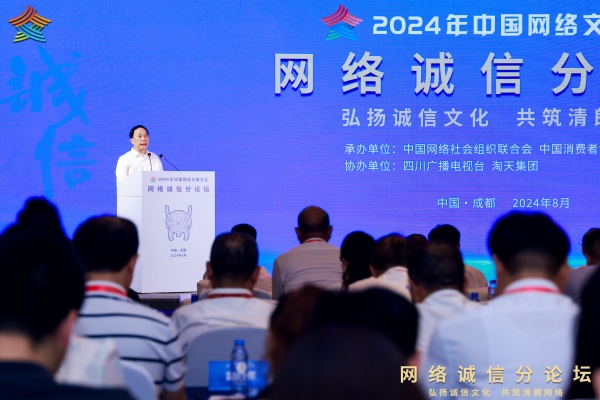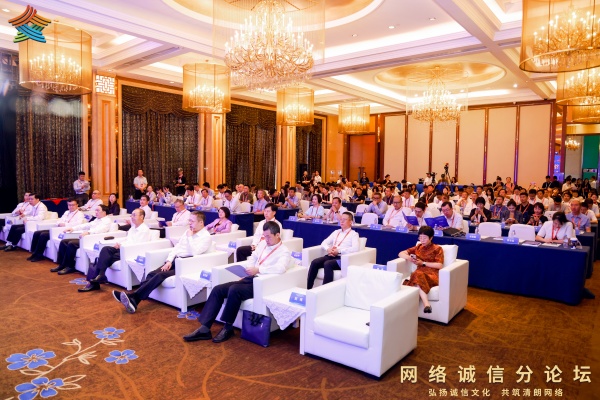
- Home
- Media Center
-
Events
- Wuzhen Summit
- Regional Forums
- Practice Cases of Jointly Building a Community with a Shared Future in Cyberspace
- World Internet Conference Awards for Pioneering Science and Technology
- The Light of Internet Expo
- Straight to Wuzhen Competition
- Global Youth Leadership Program
- WIC Distinguished Contribution Award
- Membership
- Research & Cooperation
- Digital Academy
-
Reports
- Collection of cases on Jointly Building a Community with a Shared Future in Cyberspace
- Collection of Shortlisted Achievements of World Internet Conference Awards for Pioneering Science and Technology
- Reports on Artificial Intelligence
- Reports on Cross—Border E—Commerce
- Reports on Data
- Outcomes of Think Tank Cooperation Program
- Series on Sovereignty in Cyberspace Theory and Practice
- Other Achievements
- About WIC
- 中文 | EN

Ren calls for efforts to address ethical challenges posed by AI
As technological revolution brings new challenges, it's essential that we use human-centered approaches and ethical practices, as well as collaborative governance to address ethical challenges posed by AI, said Ren Xianliang, secretary-general of the World Internet Conference (WIC).

Ren Xianliang, secretary-general of the World Internet Conference, makes remarks at the 2024 China Internet Civilization Conference. [Photo from the 2024 China Internet Civilization Conference]
Ren made this remark at the 2024 China Internet Civilization Conference in Chengdu, the capital of Southwest China's Sichuan province, on Aug 29, where he delivered a speech at the sub-forum on internet integrity.
The new wave of technological revolution and industrial transformation is accelerating economic and social development, fundamentally reshaping how people work, live, and think, Ren said.
Ren acknowledged that alongside technological advancements, new challenges such as privacy breaches, algorithms opacity, model biases, and misinformation, have sparked ethical debates and raised concerns for the building of a trustworthy society.
To address the new challenges in building a trustworthy society brought about by rapid technological development such as artificial intelligence, it is essential to prioritize a human-centered approach and ensure that ethics lead the way, he noted. All stakeholders must ensure that AI serves humanity, aligning with shared values and promoting responsible development to continuously reinforce the foundation of a trustworthy society.

[Photo from the 2024 China Internet Civilization Conference]
It is crucial to foster openness and inclusiveness, advancing fairness and universal benefit. Diverse AI training data and application scenarios are key to preventing bias and discrimination, while AI costs and accessibility barriers should be reduced to ensure broad access to the benefits of technology, he said.
Ren emphasized the need to strengthen data governance and safeguard privacy. He urged all stakeholders to enhance research on personal information and privacy protection to prevent data breaches and misuse.
Additionally, Ren further underscored the importance of promoting collaborative governance and establishing ethical norms. All stakeholders should adhere to the principle of joint consultation, construction, and shared benefits, he noted, adding that all stakeholders should actively advance AI ethical governance to develop governance solutions and action plans with broad consensus.
Ren highlighted that the development and governance of AI are ongoing focal points for the WIC. In June 2023, the WIC held the Nishan Dialogue on Digital Civilization, where global stakeholders gathered to explore building a secure, trustworthy, and inclusive digital world. At the 2023 WIC Wuzhen Summit, the Research Report and Consensus on Developing Responsible Generative Artificial Intelligence was released, calling for reliable, transparent, controllable, and value-aligned generative AI. Looking ahead, the WIC will strengthen collaboration with various sectors to contribute wisdom and effort for the development of a trustworthy digital society in the digital age.

The World Internet Conference (WIC) was established as an international organization on July 12, 2022, headquartered in Beijing, China. It was jointly initiated by Global System for Mobile Communication Association (GSMA), National Computer Network Emergency Response Technical Team/Coordination Center of China (CNCERT), China Internet Network Information Center (CNNIC), Alibaba Group, Tencent, and Zhijiang Lab.





